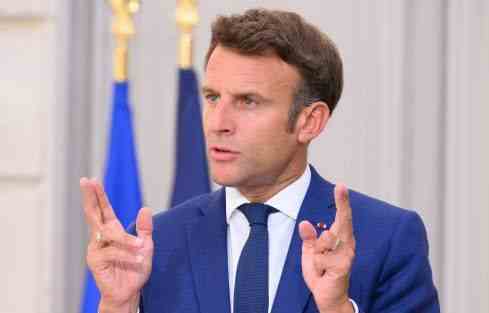Emmanuel Macron gave, this Thursday morning in Marcoussis (Essonne), the kick-off of the National Council for Refoundation (CNR), wanted as a tool for “democratic renewal”, but already contested and even boycotted by the oppositions. Here are the essentials of the president’s announcements, made during a press briefing which preceded a meeting behind closed doors… at the request of participants.
Launch of a citizens’ convention on the end of life
Emmanuel Macron confirmed the upcoming launch of a “citizen convention” on the end of life, believing “that we must move for more humanity”. “The approach on which I committed myself during the presidential campaign is to launch a citizens’ convention in its own right but also to make the political forces work” in parliament, assured the Head of State, recalling that the ethics committee was to submit a report to him “next Tuesday” September 13.
“I will have the opportunity next Tuesday to say the method and how we are going to punctuate this work to allow society to take into account the essential developments on this immense subject”, he specified.
Towards an “online consultation”
A “very broad national consultation” online and on the ground will be launched “as of next week” to put the French “within the great choices of the nation”, said Emmanuel Macron, believing that this great consultation “will come complete » the territorial variations of the CNR. “I want there to be debates on the ground that can be online, that can be open. All of this deserves transparency, openness, ”said Emmanuel Macron.
“We are in a historic situation”, with climate and energy challenges and the war in Ukraine, hammered the head of state. In this context, it is necessary “to arm oneself with good will, courage” and “to act on the ground” to “change things in depth”, he added.
A site dedicated to the CNR must also be launched in the evening, according to the Elysée.
Leave the “door open” to skeptics
While this new body is shunned at its opening by the oppositions and several unions, Emmanuel Macron judged that the absentees were “wrong”. But the president still assured that “the door will always be open” for further discussions. “Fifty-two people representing political forces, unions and elected officials have been invited, forty are there. The 12 who are not there are wrong (…) and we must not explain afterwards that we were not consulted, or that it is too vertical,” declared the Head of State.
On the holding of the debates behind closed doors, which some participants would have requested, the president explained that “the key (was) to install confidence” and that he had therefore “left the choice” to them behind closed doors or not.
From the extreme right to the extreme left, the oppositions see above all in the CNR a means for the president to circumvent Parliament, where his camp no longer has an absolute majority, to regain control in the public debate. It should be noted that only three unions were present: the CFDT, the CFTC and the Unsa.
A CNR that can “lead to referendums”
Emmanuel Macron did not exclude that proposals resulting from the debates of the CNR could “lead to referendums”. “I do not exclude anything (…) if the process that we are launching today allows us to follow up on this, we will do it”. After the CNR, there will be a “collective delivery” phase to “create consensus” and “say what we agree on and what we disagree on”.
“There is at the same time a part of action”, underlined the president, before adding: “From the next few weeks, we will change the school, health, thanks to its territorial variations, by building these sheets (of road). So yes, that can also lead to referendums”. Five major themes have been selected for the discussions to come in the coming months: full employment, school, health, “ageing well” and ecological transition.
After an introductory remark by the president, the participants presented their expectations and priorities. In the afternoon, Prime Minister Elisabeth Borne will chair a meeting to determine the projects and establish their long-term implementation.

